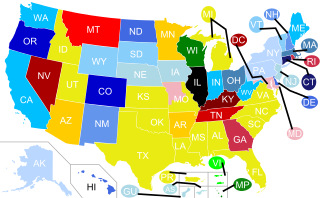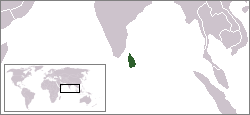Sex and the law deals with the regulation by law of human sexual activity. Sex laws vary from one place or jurisdiction to another, and have varied over time. Unlawful sexual acts are called sex crimes.

The United States has inherited sodomy laws which constitutionally outlawed a variety of sexual acts that are deemed to be illegal, illicit, unlawful, unnatural and/or immoral from the colonial-era based laws in the 17th century. While they often targeted sexual acts between persons of the same sex, many sodomy-related statutes employed definitions broad enough to outlaw certain sexual acts between persons of different sexes, in some cases even including acts between married persons.
Dudgeon v United Kingdom (1981) was a European Court of Human Rights (ECtHR) case, which held that Section 11 of the Criminal Law Amendment Act 1885, which criminalised male homosexual acts in England, Wales and Northern Ireland, breached the defendant's rights under Article 8 of the European Convention on Human Rights.
Section 377A was a Singaporean law that criminalised sex between consenting adult males. It was introduced under British colonial rule in 1938 when it was added to the Penal Code by the colonial government. It remained a part of the Singapore body of law after the Penal Code review of 2007 which removed most of the other provisions in Section 377. It was subsequently repealed in its entirety in 2023.
Section 377 is a British colonial penal code that criminalized all sexual acts "against the order of nature". The law was used to prosecute people engaging in oral and anal sex along with homosexual activity. As per a Supreme Court Judgement since 2018, the Indian Penal Code Section 377 is used to convict non-consensual sexual activities among homosexuals with a minimum of ten years’ imprisonment extended to life imprisonment. It has been used to criminalize third gender people, such as the apwint in Myanmar. In 2018, then British Prime Minister Theresa May acknowledged how the legacies of such British colonial anti-sodomy laws continue to persist today in the form of discrimination, violence, and even death.
Modinos v. Cyprus 16 EHRR 485 is a judgment of the European Court of Human Rights concerning Article 8 of the European Convention on Human Rights.

Lesbian, gay, bisexual, and transgender (LGBT) rights in Cyprus have evolved in recent years, but LGBTQ people still face legal challenges not experienced by non-LGBT residents. Both male and female expressions of same-sex sexual activity were decriminalised in 1998, and civil unions which grant several of the rights and benefits of marriage have been legal since December 2015. Conversion therapy was banned in Cyprus in May 2023. However, adoption rights in Cyprus are reserved for heterosexual couples only.

The age of consent varies by jurisdiction across Europe. The ages of consent – hereby meaning the age from which one is deemed able to consent to having sex with anyone else of consenting age or above – are between 14 and 18. The vast majority of countries set their ages in the range of 14 to 16; only four countries, Cyprus (17), Ireland (17), Turkey (18), and the Vatican City (18), set an age of consent higher than 16.

Lesbian, gay, bisexual, and transgender (LGBT) people in Tunisia face legal challenges not experienced by non-LGBT residents. Both male and female kinds of same-sex sexual activity are illegal in the country. According to the United States Department of State's 2018 report on human rights in Tunisia, "authorities occasionally use [the anti-sodomy law] to detain and question persons about their sexual activities and orientation, reportedly at times based on appearance alone."

Lesbian, gay, bisexual, and transgender (LGBT) people in Sri Lanka face significant challenges not experienced by non-LGBT residents.

National Coalition for Gay and Lesbian Equality and Another v Minister of Justice and Others is a decision of the Constitutional Court of South Africa which struck down the laws prohibiting consensual sexual activities between men. Basing its decision on the Bill of Rights in the Constitution – and in particular its explicit prohibition of discrimination based on sexual orientation – the court unanimously ruled that the crime of sodomy, as well as various other related provisions of the criminal law, were unconstitutional and therefore invalid.

Toonen v. Australia was a landmark human rights complaint brought before the United Nations Human Rights Committee (UNHRC) by Tasmanian resident Nicholas Toonen in 1994. The case resulted in the repeal of Australia's last sodomy laws when the Committee held that sexual orientation was included in the antidiscrimination provisions as a protected status under the International Covenant on Civil and Political Rights (ICCPR).

A sodomy law is a law that defines certain sexual acts as crimes. The precise sexual acts meant by the term sodomy are rarely spelled out in the law, but are typically understood and defined by many courts and jurisdictions to include any or all forms of sexual acts that are illegal, illicit, unlawful, unnatural and immoral. Sodomy typically includes anal sex, oral sex, manual sex, and bestiality. In practice, sodomy laws have rarely been enforced to target against sexual activities between individuals of the opposite sex, and have mostly been used to target against sexual activities between individuals of the same sex.

Lesbian, gay, bisexual, and transgender (LGBTQ) persons in Belize face legal challenges not experienced by non-LGBT citizens, although attitudes have been changing in recent years. Same-sex sexual activity was decriminalized in Belize in 2016, when the Supreme Court declared Belize's anti-sodomy law unconstitutional. Belize's constitution prohibits discrimination on the basis of sex, which Belizean courts have interpreted to include sexual orientation.

Lesbian, gay, bisexual, and transgender (LGBT) persons in TRNC (Turkish Republic of Northern Cyprus) face legal challenges not experienced by non-LGBT residents. Same-sex sexual activity has been legal in Northern Cyprus since 7 February 2014. Previous laws allowed three years prison sentences, according to Articles 171 and 173 of its criminal code. Female homosexuality was not criminalised. Arrests for homosexuality have occurred as recently as 2011.

Naz Foundation v. Govt. of NCT of Delhi (2009) is a landmark Indian case decided by a two-judge bench of the Delhi High Court, which held that treating consensual homosexual sex between adults as a crime is a violation of fundamental rights protected by India's Constitution. The verdict resulted in the decriminalization of homosexual acts involving consenting adults throughout India. This was later overturned by the Supreme Court of India in Suresh Kumar Koushal vs. Naz Foundation, in which a 2 judge bench reinstated Section 377 of the Indian Penal Code. However, even that was overturned by a 5 judge bench in Navtej Singh Johar v. Union of India in 2018, decriminalizing homosexuality once again.

Queer Cyprus Association is an LGBTQ rights organisation in Northern Cyprus aimed to deal with criminal law amendments of TRNC which criminalises same-sex relationships. They seek equal human rights including to "fully decriminalize homosexuality, equalize the age of consent and better protect LGBTQ people under the law.”
Section 20A of the Immorality Act, 1957, commonly known as the "men at a party" clause, was a South African law that criminalised all sexual acts between men that occurred in the presence of a third person. The section was enacted by the Immorality Amendment Act, 1969 and remained in force until it was found to be unconstitutional in 1998 by the Constitutional Court in the case of National Coalition for Gay and Lesbian Equality v Minister of Justice.

Decriminalization of homosexuality is the repeal of laws criminalizing same-sex acts between multiple men or multiple women. It has taken place in most of the world, except much of Africa and the Muslim world.

Some or all sexual acts between men, and less frequently between women, have been classified as a criminal offense in various regions. Most of the time, such laws are unenforced with regard to consensual same-sex conduct, but they nevertheless contribute to police harassment, stigmatization, and violence against homosexual and bisexual people. Other effects include exacerbation of the HIV epidemic due to the criminalization of men who have sex with men, discouraging them from seeking preventative care or treatment for HIV infection.














